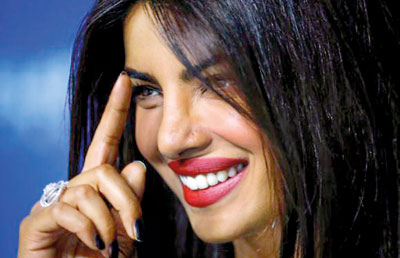Sunday Times 2
South Asian women step out of Bollywood, into serious dramatic roles
View(s):TORONTO (Reuters) – A trio of films stepped beyond Bollywood song-and-dance to show South Asian women grappling with male-dominated sport, child marriage, and sexual desire of people with disability in their premieres at the Toronto Film Festival.

Bollywood actress Priyanka Chopra of India speaks during the news conference for ''Mary Kom'' at the Toronto International Film Festival (TIFF) in Toronto (Reuters)
While the stories told vastly different tales, all sought to challenge their home audiences and provoke change. Two of them used established Indian stars to do it.
In “Mary Kom,” former Miss World Priyanka Chopra plays the real-life title role of a five-time world champion boxer taking on bullying boys and then corrupt officials while also juggling marriage and motherhood.
Chopra, a Bollywood superstar, did not use a stunt double for the fight scenes and took on a punishing training regime to give her petite frame a more athletic form.
She said the film resonates in part because of recent high profile cases of sexual violence that caught world attention.
“It’s a time where the country is coming together to say ‘we protect our women and we give them rights’ and the women are coming together and saying ‘we’re tough, we’re strong, we’re not going to take this sitting down’,” she told Reuters.
The biopic was bankrolled in part by Sanjay Leela Bhansali, a major Bollywood player, and has faced criticism in India for overly dramatizing the life of a national icon.
Meanwhile, first-time feature film director Afia Nathaniel struggled to find local financing for her film “Dukhtar” (Daughter), about a Pakistani woman fleeing a marriage her husband had arranged for their 10-year-old daughter.
After years in the funding wilderness, Norway’s Sorfund came on board, helping the film garner additional backers.
“Our local film industry is in shambles and financiers want to see masala films with women wearing almost nothing dancing and gyrating on the screen,” she said. “Masala films” refers to the mixing of genres in mainstream South Asian film. Filming in a remote part of the disputed Kashmiri region had to be halted at one point under threat of a fatwa issued by a local religious authority.
For director Shonali Bose, an outburst from her cousin and the death of her teenage son inspired “Margarita, With A Straw,” about a young woman with cerebral palsy who explores her budding sexuality in a film Bose expects will shock Indian viewers.
The film will have a wide domestic release but must first make it past censors who will screen female masturbation and lesbian sex scenes.
“I deliberately pushed the envelope with that because that is something which is so completely never talked about or expressed,” she said in a interview in reference to a specific masturbation scene.
“You’re not supposed to fulfill your own sexual needs. That’s considered bad.”
That the character is also disabled adds another layer, said leading actress and Bollywood star Kalki Koechlin.
“It’s pushing borders, not just about disability but about the way we think in terms of community and caste in India and how we place people in different boxes quite conveniently.”

